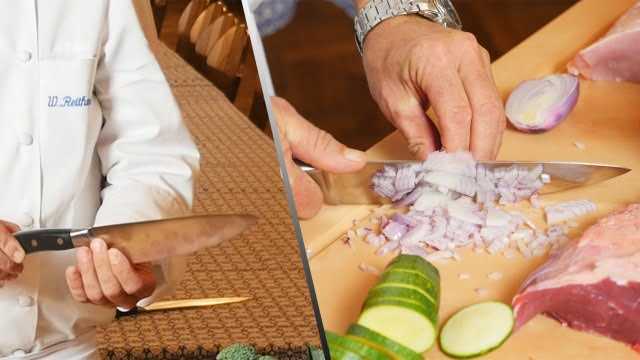If you own good kitchen knives or would like to buy some, you should pay attention to one important point: a suitable knife block. This not only protects the knives, but in the best case can also maintain or sharpen them. This means you can enjoy sharp blades for longer and at the same time they are professionally stored away when you don’t need them.
However, there are big differences in knife blocks, many come in a set with knives, others without and not all blocks are suitable for every knife. Our partner AllesBeste tested eight models worth between 15 and 250 euros. The result shows that good knife blocks can be expensive, but they don’t have to be.
In the following table we briefly present the test winner, the price tip, a cheap set winner and a high-end model. You can read more information about the products and what you should pay attention to when buying them in our detailed purchase advice.
Caring for & sharpening knives: Tips from the experts
How often should you sharpen your knives
Every knife loses its sharpness with use. “When it needs to be reground depends heavily on the material and how intensively you work with it,” says Jens-Heinrich Beckmann, Managing Director of the Industrial Association for Cutlery and Household Goods in Solingen. “Many professional chefs sharpen their knives every working day. In private households, it is usually sufficient to use the knife sharpener once a week or every 14 days.” However, the more often you sharpen the knife, the shorter the sharpness lasts. It is therefore sufficient to sharpen as soon as the knives are too blunt for you.
Knife sharpener: The practical solution for laypeople
If you’re not an expert at sharpening, you should refrain from using a whetstone and instead make do with a practical alternative: a manual or electric sharpener. Here the knife is pulled through several times and thus sharpened safely and correctly. “You can’t go wrong with that,” says Beckmann. Our partner AllesBeste has also tested knife sharpeners. The short summary of test winners, price tips and Co. can be found here.
The right cutting mat
In some cases, users have it in their own hands to ensure that knives do not become blunt prematurely. “A lot depends on the cutting base,” says Schade. “We recommend soft boards made of wood or plastic that protect the cutting edge.” Hard bases made of glass, marble or stainless steel, on the other hand, are poison for knives, no matter how chic they look.
Dishwasher or hand wash?
Good knives should always be washed by hand. They don’t belong in the dishwasher. “They are susceptible to rust there, and rust film can form,” says Beckmann. The high temperatures during rinsing are also not beneficial. The knives will dull over time. And the cleaning salts can seriously damage the blades.
